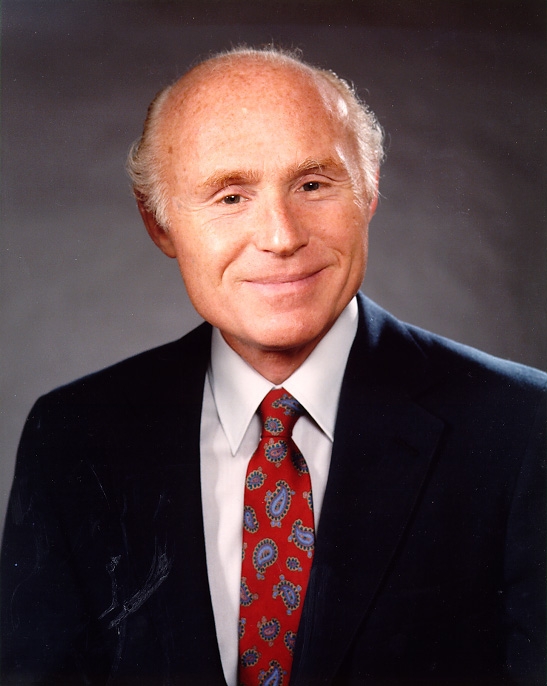Foundation Helps Herb Kohl Get $20 Million Windfall
His “$100 million gift” to Greater Milwaukee Foundation will gain him huge tax break for supporting new NBA arena.
Yesterday was a big day for the Greater Milwaukee Foundation. The foundation announced it was receiving “the largest charitable gift in its history,” exactly $100 million from Herb Kohl.
“This wonderful news comes as the Greater Milwaukee Foundation embarks upon its celebration of 100 years of service to this community,” said Ellen Gilligan, President and CEO of the Greater Milwaukee Foundation. “From his years in business, philanthropy, and the U.S. Senate…. Sen. Kohl has been a shining example of service. He has always served with both distinction and a generous spirit.”
At first glance, that sounds like a fantastic windfall, increasing the assets of the $711 million foundation by more than 14 percent. But it turns out this isn’t a gift at all. The foundation will simply pass-through the $100 million Kohl had already promised for a new arena to that project. And so Kohl gets a charitable write-off for money that will essentially go to benefit a private business.
“It’s a classic tax avoidance maximization approach,” says Aaron Dorfman, executive director of the Washington, D.C.-based National Committee for Responsive Philanthropy. Dorfman notes that because Kohl sold the team this year, “he needs to get the donation on the books for this tax year.” And the foundation was happy to help Kohl. “We are honored to help a dedicated philanthropist fulfill his charitable wishes,” Gilligan told Urban Milwaukee.
Kohl sold the Bucks for $550 million, with the understanding he would commit $100 million to help pay for a new arena. It helped make the sale more attractive to new owners Marc Lasry and Wesley Edens, which in essence meant Kohl was getting $450 million for the team. That was still huge windfall for him: Kohl purchased the team in 1985 for $18 million, meaning the $450 million sales price gave him a magnificent, 25-fold return on his investment.
But it turns out his return will be even better because Kohl is converting part of that business deal into a charitable donation. Kohl will be taxed at 20 percent for capital gains in selling the team, Dorfman notes, and as high as 36 percent for his other income, meaning he will get a $20 million to $36 million tax write-off on his $100 million contribution to the new arena. “It means the taxpayers will be paying $20 million to $36 million of his $100 million gift,” Dorfman notes.
Actually, this only includes the federal tax exemption. Kohl will also get a state tax exemption for his gift, which will increase the taxpayer-paid portion of his contribution.
In short, Kohl and the new owners of the Bucks are already planning to make the entire new arena some kind of non-profit that will be tax-exempt, even though it must be built solely to create for revenue for the team. As I’ve often noted, the Bradley Center, which opened in 1988, works perfectly fine for all of its other tenants; only the Bucks need the new arena, in order to create new amenities and profit-making opportunities for the team.
To date, no one involved with the push for a new arena has divulged that it will be tax-exempt, and for good reason. This means the taxpayers of Milwaukee will be subsidizing all the city services the arena receives and which any business would have to pay for through property taxes. Assuming the arena costs the current estimate of $450 million, this means it would be paying about $13 million a year in taxes, or about $325 million over 25 years — all money Milwaukee’s taxpayers will instead be charged.
Kohl and the new Bucks owners couldn’t be counting on the arena being a non-profit unless Mayor Tom Barrett has already okayed that idea or Gov. Scott Walker has agree to create some kind of state-created entity like the Bradley Center — or to allow the state-created entity that runs the Bradley Center to run the new arena. Whichever is the case, not a word of this has been shared with taxpayers.
And no, it’s not the same scenario as the Bradley Center. In that case, philanthropist Jane Pettit gave the facility as a gift to the city and received no benefit for doing so, and it was the city’s choice to accept or reject the money. In this case the owners are demanding a subsidy, which they hope to get from the state, to pay for most of the facility, and yet will not pay any taxes on a facility built solely to increase the team’s annual revenue. Adding insult to injury, Kohl’s $100 million offer to help pay for the facility, which helped cement the deal to sell the Bucks, will now be treated as a charitable donation.
Though the foundation’s willingness to essentially launder Kohl’s money is legal, Dorfman says a foundation gift to a pro basketball team’s arena does raise questions. “It could be questionable whether an arena that benefits the Bucks has a broader community benefit,” he says.
There is a historical parallel here. When Miller Park was built, the Bradley Foundation provided a loan at a below-market interest rate to help build the facility. The loan meant the foundation lost in the neighborhood of $4 million in interest it would have gained through its typical investments. It would have been illegal had the money gone directly to the Milwaukee Brewers, but instead it went to the Southeast Wisconsin Professional Baseball Park District, the government entity which runs the stadium for the benefit of the pro-profit Milwaukee Brewers. Here too, charitable dollars were passed through a tax-exempt entity to a private business.
At the time, the decision was critiqued by Douglas Jansson, who said “the question is raised whether that’s the best use of charitable funds.” Jansson, as it happens, was the executive director of what was then known as the Milwaukee Foundation. His successor Ellen Gilligan appears to be doing something similar to the deal he once questioned.
Short Take
The Milwaukee Journal Sentinel hasn’t exactly been digging into the question of why the deal to sell the Journal Sentinel building to the Bucks has fallen through. Given that the reporters work for the company, that becomes a very uncomfortable situation.
The best Don Walker has been able to do is get this statement: “The Journal thing appears to have fallen by the wayside,” one source said. “It’s a great site, but it’s hard to get an agreement.”
This presents the ironic scenario where a newspaper likely to editorialize in favor of the new arena is a key obstacle to a deal being done.
There is, however, one other complication: the Journal company’s new buyer, E. W. Scripps, is about to takeover the company, and that may raise sticky issues about who benefits from the sale.
All of which, it appears, is pushing the Bucks owners to consider a different site.
Update 2:30 p.m. December 18: Mayoral spokesman Jodie Tabak informs me that Barrett has not agreed to make the new NBA arena tax exempt.
If you think stories like this are important, become a member of Urban Milwaukee and help support real, independent journalism. Plus you get some cool added benefits.
More about the New Bucks Arena
- Murphy’s Law: Bucks Violating Promises on Unions? - Bruce Murphy - Jun 5th, 2025
- Back in the News: Bucks Owners Continue to Cash In - Bruce Murphy - Nov 28th, 2022
- Murphy’s Law: Bucks Subsidy An Issue in US Senate Race - Bruce Murphy - May 9th, 2022
- Murphy’s Law: Bucks Franchise Worth $1.86 Billion - Bruce Murphy - Jan 25th, 2021
- Op Ed: County Parks Lost Funding to Bucks Arena - Patricia Jursik - Jul 7th, 2020
- Eyes on Milwaukee: Fiserv Forum Workers to Get $15/Hour - Jeramey Jannene - Jan 29th, 2020
- Eyes on Milwaukee: Bucks Beat Hiring Targets on Fiserv Forum - Jeramey Jannene - Nov 20th, 2019
- Murphy’s Law: Taxpayers Make Bucks, Brewers Rich - Bruce Murphy - Apr 16th, 2019
- Eyes on Milwaukee: Bucks Unveil Master Plan for Park East - Jeramey Jannene - Mar 15th, 2019
- Eyes on Milwaukee: Bucks Plan Massive Arena Signs - Jeramey Jannene - Feb 12th, 2019
Read more about New Bucks Arena here
Political Contributions Tracker
Displaying political contributions between people mentioned in this story. Learn more.
- June 29, 2017 - Tom Barrett received $1,000 from Herb Kohl
- March 3, 2016 - Tom Barrett received $5,000 from Herb Kohl
Murphy's Law
-
The Wealth of Froedtert Hospital
 May 27th, 2025 by Bruce Murphy
May 27th, 2025 by Bruce Murphy
-
Milwaukee’s City Slogan Is… What?
 May 19th, 2025 by Bruce Murphy
May 19th, 2025 by Bruce Murphy
-
Racism Erupts in Racine County
 May 14th, 2025 by Bruce Murphy
May 14th, 2025 by Bruce Murphy























Smart tax policy but remember that you can only give away half of your net income every year so it probably will not amount to that much.
Isn’t $100 million less than half of Kohl’s net income?
If you count the whole Bucks price it would be but his net worth has been listed as $390 mil
Hence why he has to do this during 2014. Any other year this way more than half his net income.
Ah, the world of the 1%ers.
Oh come on! Who cares? The man is still giving away a load of money.
I think one interesting aspect of this is Kohl must be pretty confident the arena is going to get built.
The only problem I have with this is that Kohl comes from a party that is always saying the “rich don’t pay their fair share” while using every conceivable tax strategy out there to minimize his taxes. I’m sure he’ll also have arrangements to have most of his estate go to a foundation like Warren Buffett to avoid the estate tax as well.
So kudos on the tax strategy, but it seems a bit hypocritical.
Why would anyone not take advantage of the tax code, you would be real dummy? The foundation could get into trouble fro laundering money. Your argument is with the dopy tax code that should be completely revised.
All Liberals are hypocrites they usually give away everyone else money. He is giving away his own, hardly hypocritical. he will probably donate that 20 million somewhere else as he has no heirs.
Bruce ?
you are better than this.
neither Barrett or Walker can approve Tax Exemption ????
That’s The IRS!!!
Frank, in the case of the Bradley Center the state legislature approved the creation of a special state-created entity that made it tax exempt. The issue of taxes here regarding the facility is the property tax, which is overseen by the state. The issue for Kohl would certainly be federal taxes, but if its an entity like the Bradley Center it would likely count as a charitable gift. Now that the Greater Milwaukee Foundation has the money from Kohl it must go to some kind of not-for-profit, they cannot donate to a for-profit. Barrett’s importance is that as mayor he could object to the legislature about losing the property taxes that should be paid by a profit-making business like the Milwaukee Bucks.
Bob, do “ALL” libs come to your site and engage in mindless hyperbole? That would drive me crazy. Btw, can you share your website with us in case we’d like to visit and engage in vigorous political discussions.
i come to this site to read mindless hyperbole. It is so easy to destroy all this BS. Bruce actually pays me to come here and stimulate some mindless debate so he has something on here of value.
If you wish to join the Wisconsin Conservative Union you too can come to my sites. The Koch bros. check is not here yet this month.
By the Way. To all of you it is Mr. Dohnal!!! And the best way to answer my rant is to say: “Yes Sir, yes sir, three bags full”. Merry Christmas!
WCD is far too modest. He does all his rabble rousing for nothing and without being requested by me. That’s the kind of generous guy he is.
Bruce, it was a hint. Worst news for you, we are leaving to see out daughter, Olympic Silver medalist Dr.Darcie Dohnal Sharapova and the grand kids and my sons: Lt. Col. Bret Dohnal, 82nd Airborne Ranger, now FBI and Lt. Commander Kevin Dohnal, Helo pilot for the Seals. All of them are trying to be as tough as the old man, for Christmas.
So all of this BS spread on this fair site will go unchallenged for ten days.
The foundation of the article may concern me, but get the facts right to be credible – the federal tax on the gain is 23.8%, not 20% (only a $20.2M difference I know), and the Wisconsin tax is higher than the charitable contribution credit, so there is no Wisco benefit. If we want to be really technical, there is also a 20% phaseout on the donation too which means the actual benefit is not at the 39.8% rate.
As this is a sale of a business asset it should not be subject to the investment surcharge and therefore Bruce’s 20% figure is accurate